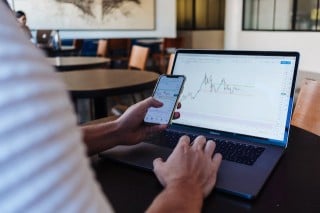What is an Open Position
Open position" is a vital stock trading term indicating an initiated transaction or position that has not yet been completed with an offsetting trade or position. The investors' strategy influences its opening and closing.
The standard way to enter an open position is buying (long position) when a bullish trend is expected and selling (short position) during a bear market trend. Decisions on closing or exiting are made immediately or later following the open position. For instance, the trade is closed if the predetermined profit is made.
Open interest in the futures market is another term for an open position. Open interest is the volume of open or active financial derivatives that still need to be exercised, closed, or physically delivered. It reflects transparency into the cash flows in the options and futures market.
Forex Open Position
When a forex trader purchases or sells a currency pair, he opens a position. On the other hand, when a forex trader buys or sells back the currency pair, the related position is closed. For instance, a forex trader would open a buy or long position if the trader believes that the base value in a currency pair will increase. The forex trader will sell or choose to open a short position if he thinks the exchange rate will decline.
To profit from Forex trading, sell at a greater price than you purchased. As a result, turning a profit always requires two transactions—buying and selling.
When specific market circumstances indicate a further change in the price in the appropriate direction, one of the transactions will be the initial choice. The probability of an asset's price rising in the future increases when it drops below its all-time low.
The second trade will determine your trading outcome if the price moves according to your prediction or goes in the opposite direction. If your forecast is accurate, you will see a positive result and take the profit and vice versa.
Forex Open Position Ratios

The open position ratio is an essential concept in forex. It is a sentiment indicator showing which currency pair has the most open interest on a given platform or exchange and the market trend. You can calculate the open position ratio by dividing the total number of trades held for all the major currency pairs on a certain trading platform by the open interest held for a specific currency pair on that platform or exchange.
Open position ratios indicate the correlations and dependencies between the positions held by forex traders and help understand potential future market patterns.
How to Enter Forex Trading?

To enter forex trading, you must consider the following trading tips.
Know the markets
Educate yourself on the forex market. Prior to risking your money, understand currency pairs and their impelling factors. It is an investment that could end up saving you a good amount of money.
Make an investment plan and stick to this plan.
Effective trading depends greatly on having a trading strategy. You should consider your profit goals, risk tolerance, assessment criteria, and methodology. Once you’ve a strategy in place, ensure that every trade you’re discerning about is inside the checks of your plan. Remember that you are most likely sensible afore performing a transaction and illogical after making a trade.
Forecast the market weather conditions
Technical traders use technical analysis tools and indicators to forecast market sentiment, whereas fundamental traders prefer to invest based on news &' other political and financial statistics. Most traders combine the two. Whatever your trading approach, it's critical that you utilize the resources at your disposal to recognize potential trading prospects in volatile markets.
Know your limitations.
Identify your limitations. It's simple, yet it's essential to your success. Understanding how much you're willing to take on each trade, regulating your leverage ratio to suit your needs, and never taking on more risk than you may afford to lose are all instances of this.
Know where to stop along the way
You don't have time to spend every waking minute watching the markets. Stop &' limit orders, which remove you from the market exposure at the value you specify and allow you to manage your risk plus secure possible earnings more effectively. Placing liable orders can not always help you lower your chance of suffering losses.
Don't be afraid to explore
Consistency is one of the keys to open positions in trading. Don't afraid to reconsider your trading plan if things aren't going as intended. Your demands probably change as you gain further experience; your plan should persistently reflect your goals. Your plan should diverge as your financial situation or goals do.
Choose the right trading Partner.
When trading on the forex market, selecting the right trading partner is essential. However, your trading experience can vary according to the execution, pricing, and customer care level.
Risks of Forex Open Positions
An open position in forex indicates market exposure for the trader. Until the position is closed, there is a risk. Depending on the approach and goals of the trader, open positions can be held for a short period or years.
When an investor starts forex trading, holding open positions feels more secure than closing them.
A beginner forex trader usually wants to open the maximum positions available. The trader should keep a balance in closed and open positions in finance.
More transactions will eventually result in no free cash remaining on the account, which is required to secure the next position.

